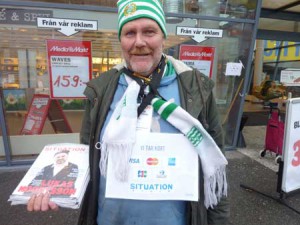STOCKHOLM–Peter, 55 years old and homeless, is standing at a Stockholm supermarket, carrying the two objects that help him make a living: a stack of magazines and a debit card reader.
The magazine, Situation Stockholm, is sold by the poor to bring in some income, but for Peter and many other vendors the problem in recent years has been that cash is falling out of use, and passersby often don’t have 50 kronor (US$7.80) at the ready to buy a copy.
The card reader, provided by the magazine’s publishers, has come to the rescue, and Peter, who asked not to be identified by his last name, couldn’t be happier.
“Customers can follow every step so that they don’t feel cheated,” he said, showing the functions of the device. “I’m impressed by this thing. It’s cool.”
Mattias Stroemberg, a potential customer taking a look at Peter’s magazines, welcomed the opportunity to pay with cards: “I never carry cash around. No one does anymore.”
In Sweden, only 27 percent of retail sales are made with cash, according to a recent paper by the European Central Bank. If online sales were included, the figure would be even smaller.
All the Nordic countries are rapidly on the way towards a cashless society, deepening an existing divide between north and south in Europe. In Greece and Romania, for example, 95 percent of transactions are still in cash.
Not everyone in Sweden cheers the transition. In a celebrated case, a would-be robber entered a Stockholm bank, but had to leave empty-handed, discovering that he had picked a cashless bank.
Criminals are not the only ones affected. From Copenhagen to Reykjavik, the cashless society has profoundly changed the ways people live.
Everything from hot dogs to taxes is paid for online, with bank cards, or by SMS. Many buses refuse cash — confounding foreign tourists — and the newly opened ABBA Museum in the Swedish capital also only accepts credit and debit cards.
“Neither retailers nor banks have any obligation to accept cash,” according to the nation’s central bank, the Riksbank.
‘A society where cash is reduced to a minimum’
“We’ll probably not see a totally cashless society in the near future, but a society where cash is reduced to a minimum and used in very few situations, is probably quite realistic,” said Niklas Arvidsson, a researcher at the Royal Institute of Technology in Stockholm, who published a study on the topic earlier this year.
The big winners are the banks and card companies, but in the end, all of society could benefit as cash is more expensive to handle than electronic payments, he said.
But the elderly and rural citizens, as well as the socially marginalised with high credit risk such as the long-term unemployed, would have problems if cash disappeared completely, he argued.
Source: China Post

